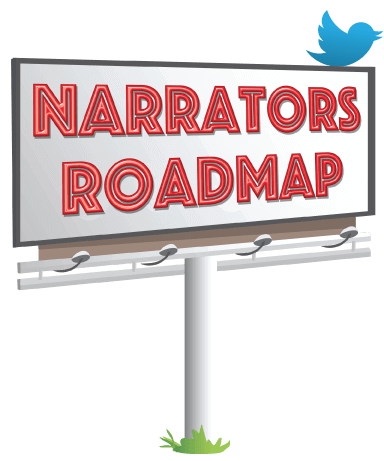Every narrator needs a web site. Web sites have replaced résumés for narrators. Your site needs to include demos/samples of your narration, as well as a way to contact you. If you use a pseudonym, consider creating a site for that pseudonym or indicating the name on your main site.
My email address appears on every page of my site. I have a contact form, but I personally hate filling in site forms and always prefer to send messages directly to an email address. You may want to set up an address specifically for your site that is different from your main address.
Domain Name
You may want to skip having your own site and simply host your demos on sites like SoundCloud or point people to your ACX profile or even a Pay-to-Play profile like Voices.com. However, you would be sending people who might be interested in hiring you to a site with 1000s of other voices. It would be too easy for your prospect to jump to another profile and completely forget you.
It’s much more powerful and professional to send people to your own site.
I suggest that you purchase your own name (if available) as your domain name and host your demos on your site. If any part of your name is frequently misspelled, I recommend that you buy the domains that match the misspellings.
For instance, I purchased most of the domains for the common misspellings of my last name and pointed them all to my site. One misspelling is in use, but I check every year to see if the owner renewed it. If they ever don’t renew it, I’ll snatch it up! As a result, I own these domains, and they all send people to my site KarenCommins.com:
- KarenComming.com
- KarenCommings.com
- KarenCommons.com
- KarenCummings.com
- KarenCummins.com
This article explains why I decided my name needs to be my brand name. I still have other domains like AVOICEAboveTheCrowd.com (my first domain) and KarenVoices.com. Anything I linked to those domains in the past still works because they are redirected to KarenCommins.com.
Include your domain URL in the signature of your emails.
Your Bio
Every word of your bio is precious real estate that should sell you to the prospective market. You’ll want to think like a journalist and write the most important facts about you at the beginning of the bio. The idea is to curate and control your bio and all the information on your site to highlight you at your best advantage.
You won’t want to include generic things that are true of any narrator, like “I love to read.” Instead, write about your specialized training. Also, indicate your life experiences that could aid a casting person in hiring you.
You may find it easier to write your bio in 3rd person. Ask your narrator friends and coaches how they perceive your marketable skills, knowledge, and experiences.
Points in your bio can become the foundations for your Quick Pitches and ongoing reach-outs with casting people.
Pictures
The best way to be cast is to form relationships with those who could hire you. At least 1 current picture of your face therefore becomes an important addition on your site.
Demos
People use the words Demos and Samples interchangeably. First, let’s talk about selection of material.
Text Selection
A demo does not necessarily showcase what you have DONE. It is a professional tool to demonstrate what you are CAPABLE of doing.
Assuming that you are not selling the demo recording or profiting from it, you MAY LEGALLY USE AN EXCERPT of copyrighted material for a demo without permission. The Fair Use doctrine of US copyright law is used as a defense in these types of copyright infringement cases.
In fact, this court case ruled on this very point. The judge found that the demo met the Fair Use standard because it was transformative, used a limited portion of the original, and did not harm the market for the original work. Thanks to narrator Emily Lawrence for the link.
I wrote more about copyright basics and the Fair Use standard in this article. The US Copyright Office explains Fair Use on this page, which includes their Index where you can search for relevant cases.
I want to point out here that Section 4(3)of the ACX Book Posting agreement explicitly grants us the right to use our ACX auditions as samples on our ACX profile. Note that it does not state that you could post the audition on your site or share it in other ways.
From a practical standpoint, a copyright owner who finds your demo and doesn’t like you using their words will simply ask you to take down the demo. If you refuse to do so, they could initiate legal action, which could cost a significant amount of money. While the Fair Use standard is a very subjective matter, it’s doubtful to me that a court would find in favor of the copyright owner. It might even refuse to hear the case.
I would caution you to choose any copyrighted excerpt carefully so that you don’t give away the key point in a book. NO SPOILERS! Otherwise, you could damage the copyright owner’s potential market and future ability to make money from the book, which would cause you to fail the Fair Use test. The copyright owner could successfully win a suit against you.
You are free to edit your excerpts! You can re-write, remove, and add sentences and phrases and change characters/genders to create a perfect little scene that serves your purpose. If any part of your text doesn’t help you demonstrate the skill, makes your sample too long, etc., don’t be afraid to kill the darling! Your editing is only limited by your imagination!
You might use Kindle Unlimited to research current books. Of course, you could read anything you wanted from a Public Domain text without concern. However, be aware that a Public Domain book might not reflect a contemporary writing style.
Finally, you have the option of writing your own script.
Think of the work you’ve done and the genres where you want to work. In all your demos, you want to catch the listener’s attention with the first line. You could have a small bit of dialogue and something that moves the story along before concluding with a final line that leaves the listener wanting to hear more.
Recordings
Samples should be one of the first things a person sees on your site. You want a producer to be able to hear your voice with no more than 2 clicks. Ideally, these recordings are linked on your home page so that a producer can go right to the one she wants to hear.
Opinions vary on the number of samples you should present. I would list at least 5 and no more than 10. For what it’s worth, I have 8 samples on my home page and a separate Demos page that includes 4 additional recordings.
You can post a mix of genres, points of view (POVs), and skills. Organize them in a way that makes sense, like grouping fiction and non-fiction samples together.
Here a few more key points to keep in mind about your demos:
- Samples are short and specific — 1-2 minutes in length of a single selection is typical. Individual samples should demonstrate a specific skill and answer a specific casting question. Producers can tell within the first 10 seconds (sometimes even earlier) whether you are right for a book. They do not have the time to wade through a long recording with multiple clips. Make their job easier with samples that highlight 1 thing you do well.
- Your audiobook demos are different from your voiceover demos. Your audiobook landing page on your site is different from your landing page for voiceover, writing, etc.
- Demos should be downloadable so that a casting person can send a clip to an author and/or other people on their team.
- Do not slate the sample.
- If you didn’t narrate a particular current/popular/bestselling book, don’t record a sample from it. You don’t want to give a false impression that you have done work you haven’t done. Plus, casting people could know the narrator who performed the audiobook and unfavorably compare you to that person.
- Label the demo with the genre, POV, and skill you want to showcase. Be sure that skill is heard early in the sample. For example, if you speak French, you’ll want to include a demo of you speaking French. Your label might be 1stPOV-French-Romance.
Other resources on this topic:
- The ACX blog article Everything You Always Wanted to Know About Samples (But Were Afraid to Ask) offers pointers that apply to samples on your site in addition to those in your ACX profile.
- Award-winning narrator Tanya Eby has written several articles about web site components. Note: You may need a subscription to read Tanya’s Substack. You’ll find a discount offer in the Welcome Center.
- Best Practices for Narration Demos On Websites This one covers many of the same points here but in more detail.
- Choosing Audiobook Samples And Demos
- Writing an Audiobook Bio
- Audiobook narrator and coach Dawn Harvey wrote a 2-part series for VoiceOverXtra about choosing demo material:
- Edge Studio posted 2 articles in which attorneys responded about using copyrighted material in your demos. They are referring more to commercials and industrial narrations, but the considerations would apply to audiobooks:
- This VoiceOverXtra article states in item 4 that the pre-merge AFTRA legal department stated it is “No problem at all.” to use copyrighted materials in your demo.
- Recommended web site designers are listed in the Welcome Center.








